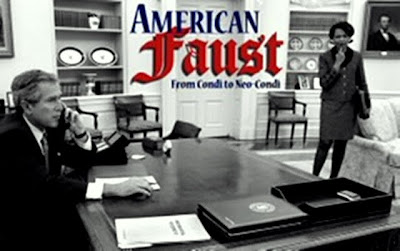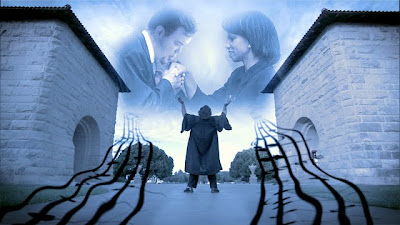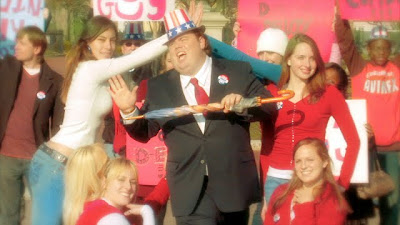As anyone who's spent any time in either film school or the film festival circuit will tell you, genre based “trendspotting” may change every year from gimmicky crime films or chatty romances but one topical approach remains the same. Just like those working in other mediums like literature, the idea of writing or filming what you know in autobiographical opuses that blur the lines of fiction and reality has always been a directorial favorite.
And despite the fact that I've seen some tremendous autobiographical “do-it-yourself” works about characters based on the writers who are going to film school or struggling to make a film, like many others who eat, sleep and breathe cinema as a career, hobby or through festivals and academia, an involuntary internal alarm sounds whenever I'm asked to review a film about "a guy making a film." Of course, as a critic it's important to remain objective but this being said, it's a major hurdle when faced with a large amount of content that sounds alike.
Although thankfully these works had built-in merit in that they were actual documentaries, nonetheless on the surface, the press release for Courting Condi and American Faust: From Condi to Neo-Condi initially sounded vaguely familiar when it was explained that the movies were personal opuses that also made the filmmaker and the filmmaking process characters in the tale.
Yet, just as quickly as I'd begun skimming the release, my mind ventured back into reporter mode. No longer considering the movies as just indie submissions, I started to fact and background check, truly drawn in by their “shock and awe” campaign. Outlining the findings of their documentaries, which focused on 9/11 and a thorough evaluation of the failure of the George W. Bush White House, I couldn't believe the information contained in the e-mail.
Eagerly anticipating the films after I made sure on my own that the facts I could track down that had been disclosed were indeed real, suddenly the prospect of a movie about guys making a movie only to discover they were making a completely different movie made this film critic feel like I was being given the chance to play Woodward and Bernstein for a brief moment. With the films operating as my very own Deep Throat, yet thankfully minus the scary parking garage set-up and '70s apparel witnessed in All The President's Men, the independently released Condi duo is of such high quality, I couldn't help wondering why they hadn't been snapped up by Robert Greenwald Brave New Films, thereby offering more people the chance to piece together facts like Julia Roberts' Darby Shaw in The Pelican Brief, to use a more recent example.
Having received over two dozen film festival awards during its critically acclaimed global circuit tour, filmmaker Sebastian Doggart's tragicomic musical documentary Courting Condi, is structurally and tonally reminiscent of My Date with Drew, Borat and Roger and Me.
As the first of two very different films, Courting Condi can either be screened separately due to the content overlap with its harder hitting Errol Morris style follow-up, American Faust or together to give you a far more fascinatingly complex cinematic piece of portraiture on former Secretary of State, Condoleeza Rice. And while it's safe to say that because of the dense yet vital information contained in the works, you probably won't want to screen them back-to-back, the filmmakers have managed an extraordinary feat with the movies releasing under their Rice inspired production banner of American Princess, LLC.
The multi-layered pictures offer startling revelations about an extraordinary yet controversial woman who has nonetheless done some absolutely horrific things. The filmmakers achieve a delicate balance of both impressing us and repelling us by presenting Rice's story twice and painting it with two distinct brushes with the unexpected frames of Condi and Faust respectively.
While each work can stand on its own as a complete film that doesn't rely on the other one from a viewer standpoint, impressively considering the knowledge they obtained, the filmmakers restrained themselves by never stooping to create an attack movie. Although one can argue that both do contain some anecdotal remarks made by colleagues that can't be taken strictly as facts (i.e. how do we know for certain that Rice is still a virgin and why does it truly matter?), they offer us a superlative and rather inspiring biography of the Birmingham, Alabama born girl who survived the tumultuous '60s civil rights era to eventually become one of the most influential women in the free world.
And while obviously, this position in the White House came with quite a price for everyone involved especially the viewers, amazingly and even by presenting the second film with a Faustian framework about hubris, the team ensures that the film remains a human story to which we can-- if not relate-- than at least understand on a level we didn't expect. Throughout both titles, they trace her rise to power, including the people and passions that she sacrificed along the way and the new people and passions she acquired to become so vital to our former president that he famously wrote a note requesting her permission to go to the bathroom.
Helmed by Cambridge educated author and Emmy nominated filmmaker Sebastian Doggart (Project Runway, Morgan Spurlock's 30 Days), the whimsical Borat like opening feature Courting Condi is easily the more crowd-pleasing work, despite the fact that predictably it was banned at Rice's scholarly base of Stanford University.
Similar to My Date with Drew, yet fortunately much more appealing than 20 Dates, Doggart films his friend Devin Ratray's quest to woo Rice during her time in Washington as Secretary of State. Perhaps best known as Macaulay Culkin's bullying older brother Buzz in Home Alone, Ratray plays himself with complete conviction as an actor, musician, and dreamer whose muse and beloved is the woman who first enchanted him on television, Ms. Condoleeza Rice.
Writing songs for Rice, originally, Ratray asked Doggart to help transform the music into video discs he could mail to her, visualizing his lyrics like his own one man version of MTV. However, when Doggart realized how serious his friend was (despite ridicule) in trying to date Rice, the two embarked on a journey that re-traced Rice's footsteps. Soon they find themselves talking to friends in Birmingham, professors in Denver where she became hooked on Russian political history in courses taught by Madeleine Albright's father Josef Korbel, before they venture to Stanford University and Washington D.C. where darker aspects of her legacy begin to spill out like film from a dropped canister.
Needless to say, Devin's love is tested as more information about Rice post 9/11 is revealed on film. And while overall, I applaud the risk taken in employing a romantic musical approach to a political documentary, I felt that ultimately Courting Condi was still a good fifteen minutes too long, slightly creepy, and nowhere near as effective as the second film. Likewise and despite Ratray's talent as a musician, the film's "stalker set-up" and approach in following her from square one was a bit on the odd side. And without at least giving us a wink to let us know if it was staged Borat style as I hoped, we're left overly uncomfortable especially in some of the more cringe-worthy scenes involving Ratray's arguments with his parents and an Oscar winning songwriter, which went from funny to painful pretty fast.
Regardless of the tonal misstep, it was a cool coincidence to see Ratray as Ratray around the same time I caught him as an actor in several other movies, by sheer chance and recognized him not as Buzz but “the guy who loved Condi.” Yet, while Courting is still worth a look due to its impressive effects and the brilliantly edited biography of Rice, American Faust is exceptional and shocking.
A far more polished, traditional documentary, Faust gives us unprecedented access and insider insight into Rice's role in Washington including the failure to pass along warning memos pre 9/11 to Bush's desk as well as her involvement in approving devastating torture interrogation techniques and shipping off suspects to other countries where more extreme measures were in dominant practice.
Extremely timely and vital for American viewers to explore, Faust leaves us with both the question of how a person can change so much and additionally, wondering whether Rice or other staffers are guilty of war crimes. A triumph in independent documentary filmmaking precisely because it took the personal autobiographical feel of the first “festival circuit” feature as a jumping off point, American Faust is on par with hard-hitting documentaries including No End in Sight, Maxed Out, Rethink Afghanistan, and Fahrenheit 9/11, and ensures that Sebastian Doggart is a name you won't soon forget.
Text ©2010, Film Intuition, LLC; All Rights Reserved. http://www.filmintuition.com
Unauthorized Reproduction or Publication Elsewhere is Strictly Prohibited and in violation of the Digital Millennium Copyright Act.
FTC Disclosure: Per standard professional practice, I received a review copy of this title in order to evaluate it for my readers, which had no impact whatsoever on whether or not it received a favorable or unfavorable critique.



















